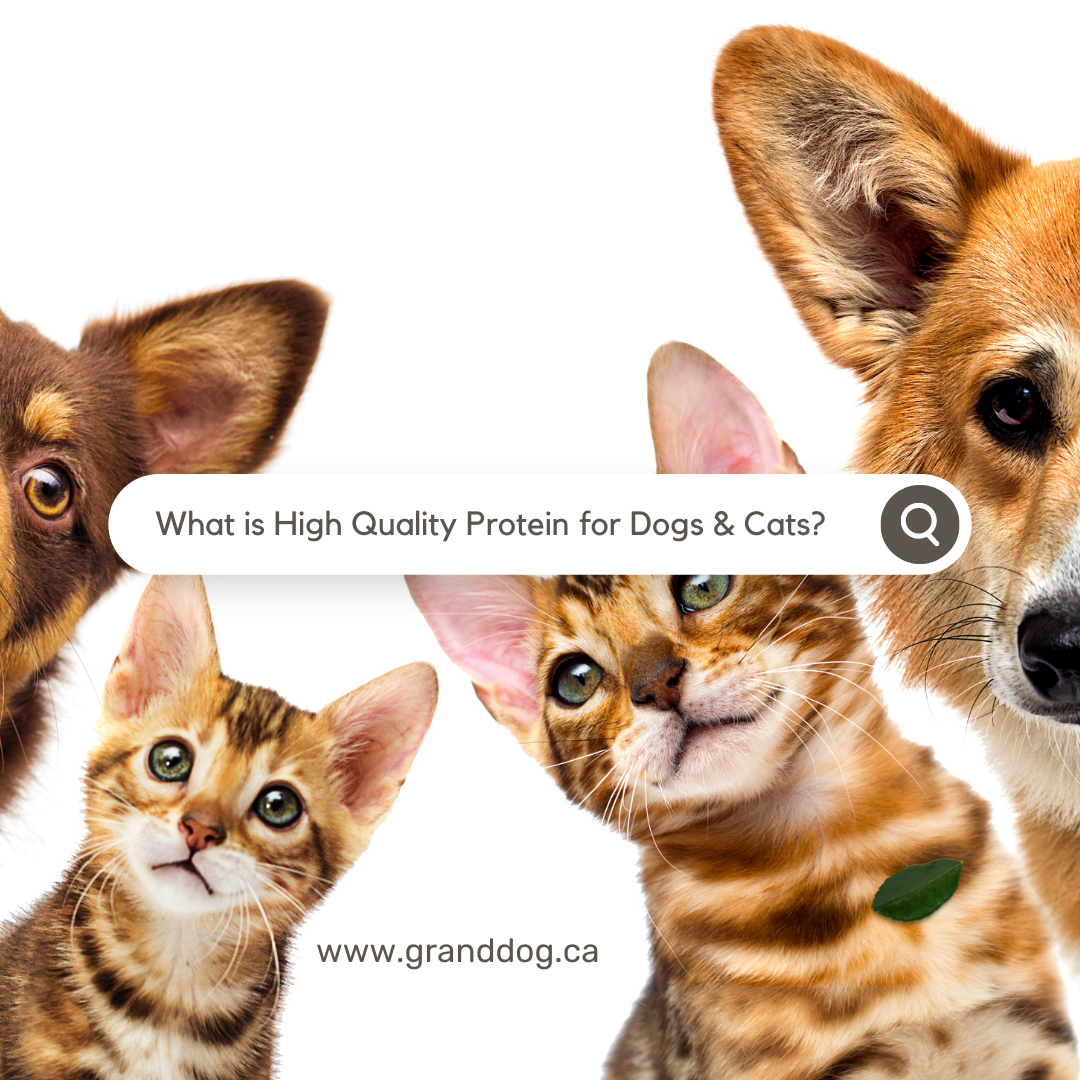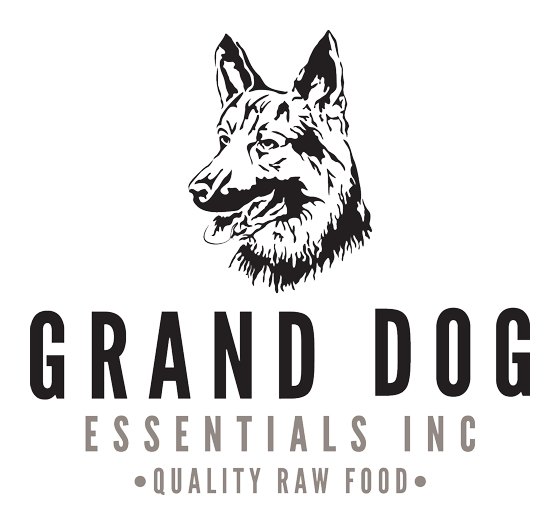What is High Quality Protein for Dogs and Cats?
January 10, 2023 – Amanda Monsma

"There are two numbers you need to know about protein, its amount (the only number on the pet food label) and the quality (a number never on the pet food label)." Excerpt from the Dogs Naturally magazine article "The Top 10 Overlooked Diet Rules" by Dr. Richard Patton
Kibble companies are falling short on nutrition for your dogs. They have worked for years convincing many that their food is the best option for your pet. But there is one glaring problem with the food they provide: the quality of protein being used.
What is protein quality? How do we know what is best for our pets? Why is quality so important for our pets' health? Let's dive in!
What determines protein quality?
We are going to look at two components that determine protein quality: amino acid profiles and digestibility. Let's start with amino acids.
There are 22 amino acids that are required for proper bodily function. Some amino acids are non essential which means that a healthy body can produce it. Other amino acids are essential, the body cannot produce them and they must be included in the diet. Ten amino acids are essential for the health of your dog and eleven for your cats.
Each protein source has a unique amino acid profile. When a protein contains a high amount of amino acids that is valuable to your dog or cat, it has a high biologic value. Proteins that contain a low amount of amino acids has a low biologic value.
Essential Amino Acids for Dogs and Cats
Amino acids play an important role in the growth, development, and overall health of your pet.
Here are a number of amino acid functions in the body:
- Controls hormones
- Supports the metabolism
- Supports production of Vitamins
- Brain, heart, and eye function
- Immune system function
- Stimulates stomach acids
- Promotes bone growth in puppies
- Appetite control
- Brain chemicals and mood
- Antibodies
- Produces serotonin to induce sleep
- Tissue repair
The 10 amino acids dogs require in their diet are: Arginine, Histidine, Isoleucine & Leucine, Lysine, Methionine, Phenylalanine, Threonine, Tryptophan, Valine
Cats require the same amino acids along with Taurine as the eleventh. Cats are unable to produce taurine in their body which makes it a vital part of their diet.
Most healthy dogs are able to produce taurine when other amino acids are present (cysteine and methionine) along with help from vitamin B-6, zinc and manganese. There are some breeds, however, that require it in their diet as they are either unable to go through the taurine synthesis or they have naturally higher requirements for the amino acid.
These breeds are: American Cocker Spaniels, Golden Retrievers, Labrador Retrievers, English Setters, Newfoundlands, Saint Bernards, Portuguese Water Dogs, Great Danes, Boxers, Irish Wolfhounds, and Doberman Pinschers
Taurine is found naturally in fish, meat, organs, and milk.
Protein Ratings
Protein is rated on an amino acid scale of 0 - 100. The higher the number, the higher the biologic value for your pets.
Eggs and meat are at the higher ends of the amino acid scale. Meat being rated at 60 - 75 and eggs rated at 100.
Here are common proteins and their ratings:
Eggs = 100
Milk = 93
Chicken = 79
Fish = 76
Beef = 75
Wheat Gluten = 64
Tofu = 64
Rice = 59
Oatmeal = 55
Beans/Lentils = 50
Wheat Four = 41
With a rating of 100, eggs are a complete protein source for dogs. Eggs alone aren't a balanced diet overall for your dog, but we recommend supplementing in their diet on a regular basis. When feeding kibble, eggs can be added, boosting the protein value of their food with a natural food source.
READ: Tips for Feeding a Blended Diet of Kibble and Raw Dog food
As you can see from the list above, plant proteins fall on the lower end of the scale, missing many of the amino acids required in your pets diet.
Many kibble formula's have very little meat included. Companies will limit the meat product and boost their protein number on the package with plant based proteins. Paying little attention to the overall protein quality.
To make up for the lack of amino acids found in the plant protein sources, dog food companies will add them back in as synthetic amino acids. When you look at a dog food ingredient list, anything that has "L" or "DL" in front of the word is a synthetic form of the amino acids.
If a pet food requires synthetic supplementation to fulfill essential nutrient requirements, what does that say about the overall quality of that food?
Protein Deficiency
Getting enough of all the essential amino acids is extremely important. When pets don't get enough they could suffer from protein deficiency. Common symptoms include:
- Poor coat health
- Change in mood
- Reduced growth rate
- Poor milk production
- Weight loss
- Anemia
A variety of fresh raw meat, eggs, fish, dairy (when tolerated) is the best way to ensure your pup is getting all the amino acids they require from natural food sources. Some plant based proteins can play a role in a dogs diet, but it should only be as a side dish and not the main course. (Ahem, kibble companies.....)
Protein Digestibility
In February 2021, The Journal of Animal Science published a study comparing the poop of dogs on a commercial kibble diet to that of a human grade (HG) diet. Their findings? Here is an excerpt directly from the abstract:
"In conclusion, the HG pet foods tested resulted in significantly reduced fecal output, were highly digestible, maintained fecal characteristics, serum chemistry, and hematology, and modified the fecal microbiota of dogs."
When your dog poops, they are excreting the remains of food that the small intestine could not digest or absorb. Your dog's body is taking what it can from it's food and excreting the rest. Kibble tends to include food that is hard for a dogs body to digest: corn, beans, grains, vegetable oils, wheat (just to name a few).
The benefits of a highly digestible diet are:
- less digestive issues (diarrhea, constipation, gas)
- optimal nutrient absorption
- easier weight management
- increased energy levels
- slower aging process
- healthy immune response
Factors that can affect digestibility of pet food:
- Meat processed at high heat
- Vitamins and minerals that are heat sensitive and damaged by cooking
- Synthetic vitamins & minerals
- High carbohydrate content
- High fibre content (some is beneficial for dogs, but too much can effect the digestibility of the food)
Variety is Queen
I like to end here with a final takeaway. I'm hoping that the above information illustrates why it's so important to feed your pets a variety of foods. The more your pets are exposed to different animal proteins, the wider array of nutrients they consume. A balanced and complete diet is one that easy to digest and includes a variety of different options.
Thanks for sharing your time with us - I hope you found this helpful! If you have any questions, feel free to comment below or send me an email!
Amanda Monsma (she/her)
amandam@granddog.ca
If you liked this, you might also like:
Supplements to Enhance Your Dog's Raw Diet
How to Build a Raw Food Diet for Cats + Transition Tips
What Your Dog's Poop is Telling You
How to Transition an Adult Dog to a Raw Diet
Guide to Feeding Raw to Puppies
SOURCES:
Feeding Dogs: Dry or Raw? The Science Behind the Debate by Dr. Conor Brady
Kick Kibble to the Curb “Revisited” - How Digestible Is Your Pet’s Diet?
Is Protein Deficiency Hurting Your Dog?
The Importance of Taurine in Your Pet's Diet
The Forever Dog by Rodney Habib & Dr. Karen Shaw Becker
Disclaimer: All information presented on this website is for informational and/or educational purposes only and based on our experience and those shared by our clients. These statements have not been evaluated by a veterinarian. This website is not intended to diagnose, treat, cure, or prevent any disease and is not intended to be a substitute or replacement for any medical treatment. Please seek the advice of a holistic veterinarian for your dog’s specific health concerns.

3 comments
I ordered the sample pack for cats & dogs. My dog loves it but my cat does not. Why is this? I really didn’t think it would be an issue. Need to know why? Thank you.
Hi Sarah! Thanks so much for your comment! I’m happy to hear you loved the article!
Kudos for the high-quality protein guide for dogs and cats! Essential reading for pet owners seeking to keep their furry friends healthy and happy.